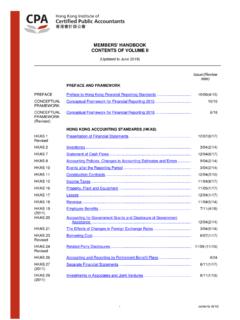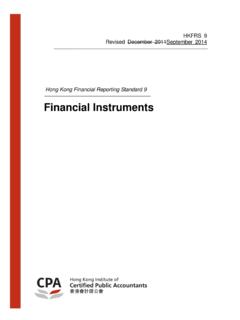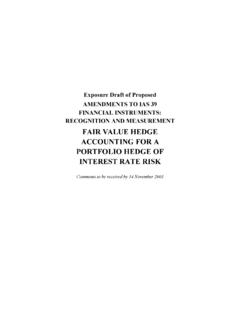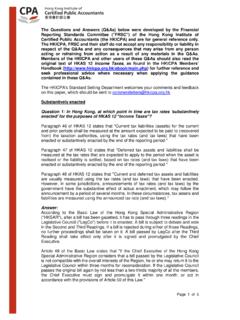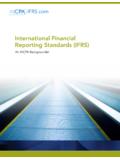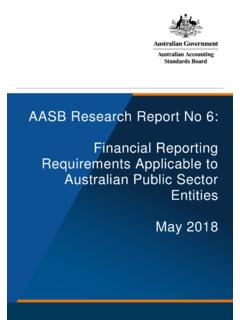Transcription of Hong Kong Financial Reporting Standard 2
1 Share-based Payment hong kong Financial Reporting Standard 2 HKFRS 2 Revised November 2016 September 2018 Effective for annual periods beginning on or after 1 January 2005 HKFRS 2 Copyright 2 COPYRIGHT Copyright 2018 hong kong Institute of Certified Public Accountants This hong kong Financial Reporting Standard contains International Accounting standards Committee Foundation copyright material. Reproduction within hong kong in unaltered form (retaining this notice) is permitted for personal and non-commercial use subject to the inclusion of an acknowledgment of the source. Requests and inquiries concerning reproduction and rights for commercial purposes within hong kong should be addressed to the Director, Operation and Finance, hong kong Institute of Certified Public Accountants, 37/F.
2 , Wu Chung House, 213 Queen's Road East, Wanchai, hong kong . All rights in this material outside of hong kong are reserved by International Accounting standards Committee Foundation. Reproduction of hong kong Financial Reporting standards outside of hong kong in unaltered form (retaining this notice) is permitted for personal and non-commercial use only. Further information and requests for authorisation to reproduce for commercial purposes outside hong kong should be addressed to the International Accounting standards Committee Foundation at 2 (June 2014 August 2016) Copyright 3 Contents from paragraph INTRODUCTION IN1 hong kong Financial Reporting Standard 2 SHARE-BASED PAYMENT OBJECTIVE 1 SCOPE 2 RECOGNITION 7 EQUITY-SETTLED SHARE-BASED PAYMENT TRANSACTIONS 10 Overview 10 Transactions in which services are received 14 Transactions measured by reference to the fair value of the equity instruments granted 16 Determining the fair value of equity instruments granted 16 Treatment of vesting conditions 19 Treatment of non-vesting conditions 21A Treatment of a reload feature 22 After vesting date 23 If the fair value of the equity instruments cannot be estimated reliably 24 Modifications to the
3 Terms and conditions on which equity instruments were granted, including cancellations and settlements 26 CASH-SETTLED SHARE-BASED PAYMENT TRANSACTIONS 30 SHARE-BASED PAYMENT TRANSACTIONS WITH CASH ALTERNATIVES 34 HKFRS 2 (August 2016 September 2018) Copyright 4 Share-based payment transactions in which the terms of the arrangement provide the counterparty with a choice of settlement 35 Share-based payment transactions in which the terms of the arrangement provide the entity with a choice of settlement 41 SHARE-BASED PAYMENT TRANSACTIONS AMONG GROUP ENTITIES 43A DISCLOSURES 44 TRANSITIONAL PROVISIONS 53 EFFECTIVE DATE 60 WITHDRAWAL OF INTERPRETATIONS 64 APPENDICES A Defined terms B Application guidance C Amendments to other HKFRSs D Comparison with International Financial Reporting standards BASIS FOR CONCLUSIONS IMPLEMENTATION GUIDANCE hong kong Financial
4 Reporting Standard 2 Share-based Payment (HKFRS 2) is set out in paragraphs 1-64 and Appendices A-C. All the paragraphs have equal authority. Paragraphs in bold type state the main principles. Terms defined in Appendix A are in italics the first time they appear in the Standard . HKFRS 2 should be read in the context of its objective and the Basis for Conclusions, the Preface to hong kong Financial Reporting standards and the Conceptual Framework for Financial Reporting . HKAS 8 Accounting Policies, Changes in Accounting Estimates and Errors provides a basis for selecting and applying accounting policies in the absence of explicit guidance. HKFRS 2 (April 2004 February 2010) Copyright 5 INTRODUCTION Reasons for issuing the HKFRS IN1 Entities often grant shares or share options to employees or other parties.
5 Share plans and share option plans are a common feature of employee remuneration, for directors, senior executives and many other employees. Some entities issue shares or share options to pay suppliers, such as suppliers of professional services. IN2 Until this HKFRS was issued, there was no HKFRS covering the recognition and measurement of these transactions. Concerns were raised about this gap in HKFRSs, given the increasing prevalence of share-based payment transactions in many countries. Reasons for amending HKFRS 2 in July 2009 IN2A* In July 2009 the hong kong Institute of Certified Public Accountants (HKICPA) amended HKFRS 2 to clarify its scope and the accounting for group cash-settled share-based payment transactions in the separate or individual Financial statements of the entity receiving the goods or services when that entity has no obligation to settle the share-based payment transaction.
6 The amendments also incorporate the guidance contained in the following Interpretations: HK(IFRIC)-Int 8 Scope of HKFRS 2 HK(IFRIC)-Int 11 HKFRS 2 Group and Treasury Share Transactions. As a result, HKICPA withdrew HK(IFRIC)-Int 8 and HK(IFRIC)-Int 11. Main features of the HKFRS IN3 The HKFRS requires an entity to recognise share-based payment transactions in its Financial statements, including transactions with employees or other parties to be settled in cash, other assets, or equity instruments of the entity. There are no exceptions to the HKFRS, other than for transactions to which other standards apply. IN4 The HKFRS sets out measurement principles and specific requirements for three types of share-based payment transactions: (a) equity-settled share-based payment transactions, in which the entity receives goods or services as consideration for equity instruments of the entity (including shares or share options).
7 (b) cash-settled share-based payment transactions, in which the entity acquires goods or services by incurring liabilities to the supplier of those goods or services for amounts that are based on the price (or value) of the entity s shares or other equity instruments of the entity; and (c) transactions in which the entity receives or acquires goods or services and the terms of the arrangement provide either the entity or the supplier of those goods or services with a choice of whether the entity settles the transaction in cash or by issuing equity instruments. * Amendments effective for annual periods beginning on or after 1 January 2010.
8 HKFRS 2 (July 2009) Copyright 6 IN5 For equity-settled share-based payment transactions, the HKFRS requires an entity to measure the goods or services received, and the corresponding increase in equity, directly, at the fair value of the goods or services received, unless that fair value cannot be estimated reliably. If the entity cannot estimate reliably the fair value of the goods or services received, the entity is required to measure their value, and the corresponding increase in equity, indirectly, by reference to the fair value of the equity instruments granted. Furthermore: (a) for transactions with employees and others providing similar services, the entity is required to measure the fair value of the equity instruments granted, because it is typically not possible to estimate reliably the fair value of employee services received.
9 The fair value of the equity instruments granted is measured at grant date. (b) for transactions with parties other than employees (and those providing similar services), there is a rebuttable presumption that the fair value of the goods or services received can be estimated reliably. That fair value is measured at the date the entity obtains the goods or the counterparty renders service. In rare cases, if the presumption is rebutted, the transaction is measured by reference to the fair value of the equity instruments granted, measured at the date the entity obtains the goods or the counterparty renders service.
10 (c) for goods or services measured by reference to the fair value of the equity instruments granted, the HKFRS specifies that all non-vesting conditions are taken into account in the estimate of the fair value of the equity instruments. However, vesting conditions, that are not market conditions, are not taken into account when estimating the fair value of the shares or options at the relevant measurement date (as specified above). Instead, vesting conditions are taken into account by adjusting the number of equity instruments included in the measurement of the transaction amount so that, ultimately, the amount recognised for goods or services received as consideration for the equity instruments granted is based on the number of equity instruments that eventually vest.

